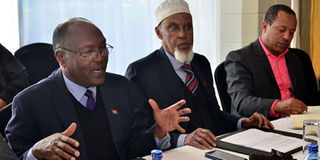Views clash on PM’s office, revenue-sharing in BBI debate

Some of the Building Bridges Initiative task force members at a past event. There are clashing views on some key issues in their report. PHOTO | FILE | NATION MEDIA GROUP
What you need to know:
- The Building Bridges Initiative team has also proposed that the PM, who will be an elected MP, earn no additional salary for the role.
- Mr Raila Odinga’s ODM party, on the other hand, wants the PM’s office to be structured on the Tanzania model.
- On revenue-sharing, the proposal is that counties be allocated 35 per cent of total revenue — a proposal most have no problem with.
The powers of a prime minister and the revenue-sharing formula are the major sticking issues in the ongoing debate on possible changes to the Constitution.
While there seems to be general agreement on the creation of a PM’s office, views vary on its structure. Amani National Congress (ANC) party leader Musalia Mudavadi cautions against making the office an executive one, saying it will create two centres of power.
“The head of state must also be the head of government and commander-in-chief of the defence forces. This authority must not be shared or open to multiple interpretations,” Mr Mudavadi said.
ADDITIONAL SALARY
Mr Raila Odinga’s Orange Democratic Movement (ODM) party, on the other hand, wants the PM’s office to be structured on the Tanzania model, where the office holder is the leader of government business and is an appointee of the President.
The Building Bridges Initiative team has also proposed that the PM, who will be an elected MP, earn no additional salary for the role.
Mr Musyoka disagrees: “Why would anybody want to be prime minister if you can be fired at any time by the President, and then you are still asked to be just an ordinary member of Parliament with no extra allowances?” he posed. The Pastoralists Parliamentary Group, led by National Assembly Majority Leader Aden Duale, wants a pure parliamentary system where the “party or coalition with the majority members forms the government”.
On revenue-sharing, the proposal is that counties be allocated 35 per cent of total revenue — a proposal most have no problem with. But pastoralists oppose the suggestion that the formula “focuses on … actual settlements (rather than) on basis of inhabited land mass”.
“The one man, one vote principle must be used concurrently with one square kilometre, one vote principle,” the Duale group, composed of MPs from 68 constituencies in 15 counties (80 per cent of Kenya’s land mass) said.
The one man, one vote, one shilling mantra is a key proposal of the Central region, whose large populations are concentrated in a small land area.




